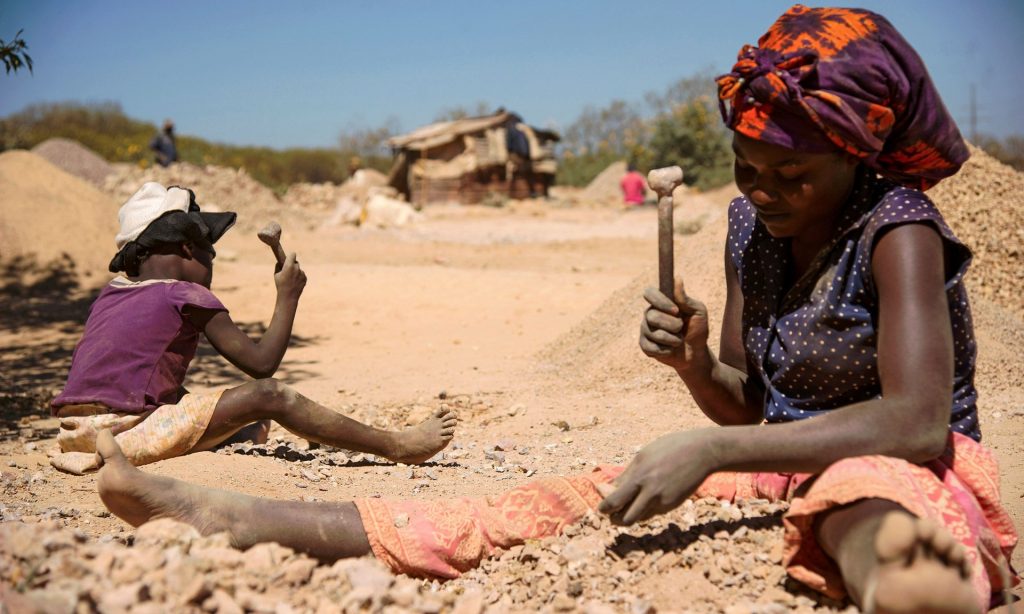
Photograph: Junior Kannah/AFP/Getty Images
Some of the world’s largest ICT companies including Hitachi, Canon and Samsung must step up their efforts to address the risk of forced labour in global supply chains, according to a new report.
KnowTheChain, a US supply chain accountability initiative, benchmarked 20 global ICT companies on their efforts to ensure there is no forced labour, a form of modern slavery, from their supply chain. The average score for companies scrutinised on a number of areas including auditing processes, recruitment practices and worker rights was 39 out of a possible 100.
“The $250bn ICT sector has seen almost unprecedented growth in the past decade yet our benchmarking shows there is still a lot to be done to address the very real risks of forced labour in ICT corporate supply chains,” says Kilian Moote, project director at KnowTheChain.

“What is clear is that the ICT sector is at the start of a really long journey when it comes to effectively dealing with this challenge.”
The KnowTheChain benchmarking report also scores and ranks individual ICT companies on their transparency in addressing the threat of forced labour. HP was given the highest score, with 72 out of 100, followed by Apple. Other brands fared less well, such as Hitachi, which scored 34 out of 100, and Canon, which scored 12.
A spokesperson for Canon said the company conducts annual surveys on the status of suppliers’ compliance initiatives, “Based on the surveys that we have conducted, to date, there have been no indications of such exploitations within our supply chain. However, we take this subject very seriously and we will study the results of KnowTheChain’s report carefully to evaluate if there are any actions we could take to further improve our standards.”
A spokesperson for Hitachi declined to comment and Samsung had not responded to a request for comment at the time of publication.
KnowTheChain selected the 20 ICT companies based on size and whether they created products that could be vulnerable to conditions of forced labour.
The International Labour Organisation estimates that forced labour generates $150bn in illegal profits every year.
ICT companies are considered to be particularly vulnerable to forced labour in their supply chains due to extensive use of migrant labour in the manufacturing of technology and electronics products in countries such as Malaysia and China, and the complex and lengthy supply chains of many ICT products.
In recent years the sector has faced increasing criticism of its failure to adequately address labour abuses connected to products sold to millions of customers across the world.
In 2014, a report by supply chain company Verité concluded that nearly one third of all migrant workers in Malaysia’s electronics industry were trapped in conditions of forced labour. Earlier this year Amnesty International revealed hazardous working conditions and child and forced labour in cobalt mines linked to some of the world’s largest technology brands.
The KnowTheChain report found that many of the 20 companies evaluated demonstrated high levels of awareness of the risk of forced labour, with 18 of the 20 companies making public commitments to address this issue.
However, the benchmarking also showed a discrepancy between these public statements and the ability to translate them into policies on the ground. Companies scored an average of 16/100 in their success in ensuring workers have a voice throughout their supply chains and are able to communicate concerns, represent their own interests and advocate for their rights.
“Forced labour will persist in the ICT industry unless workers at the lowest tiers of the supply chain can voice their concerns,” says Annabel Short, deputy director at the Business and Human Rights Centre, one of the partners in the KnowTheChain initiative.
“Vulnerable migrant workers must be able to organise and to access trusted, reliable grievance mechanisms. We hope this … spurs companies on to the road to improvement.”
As well as public awareness and worker rights, KnowTheChain also evaluated companies on commitment and governance, traceability and risk assessment, purchasing practices, recruitment, monitoring and remedy.
While companies only scored an average of 19/100 for recruitment practices, they fared better in areas such as traceability. The report found that 16 out of the 20 companies had processes to trace the presence of conflict minerals in their supply chains.
KnowTheChain was launched by US anti-slavery foundation Humanity United, the Business & Human Rights Centre, Sustainalytics and Verité last year. It says it expects to launch similar benchmarking reports on the food and beverage, and apparel and footwear, sectors in the coming year.

